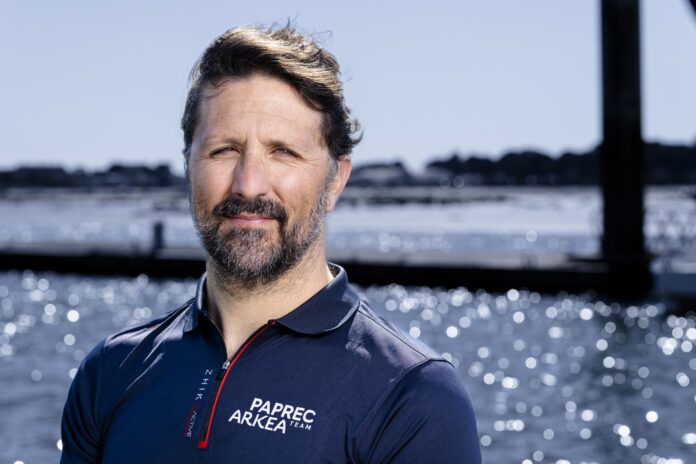Yoann Richomme, French skipper, is participating in The Ocean Race Europe for the second time. He explains the challenges of the race, the weather conditions in the Mediterranean, and the environmental issues concerning the oceans.
Sunday is the big departure! The Ocean Race Europe starts this Sunday, from Kiel, Germany. The skippers will anchor in Nice from August 29 to 31. Frenchman Yoann Richomme aims for a second victory on his boat Paprec Arkéa, following his 2021 win with the Mirpuri Foundation Racing Team. It’s a tough race, with constantly changing weather conditions.
How are you feeling ahead of the big departure on Sunday?
“The whole team is feeling great; we had a good preparation. We just raced the Rolex Fastnet in England. It went quite well with a third place, and we optimized our boat well. I’m thrilled with the crew I recruited for this race. We can’t wait for it to start; it’s going to be a very intense challenge. We’re setting off for a month and a half, head down, with navigation almost every day. It’s going to be extremely intense; we know we’ll end up exhausted, but we also know we love this race format.”
You are about to embark on a race you won in 2021; how does it differ from other races, especially with different seas and an ocean to cross?
The issue is that everything changes except the boat. These are our solo yachts with which we competed in the Vendée Globe. But here, we’re putting them on a course very close to the coasts around Europe, from the Baltic to the Adriatic. There are five people in total, four sailors and one media person on board to film. We need to adapt maneuvers, conduct, communicate well among ourselves, and optimize the boat for these relatively light summer conditions in Europe. For this, we’ve made different sails, lightened the boat, and tried to modify everything we could.
What changes once you arrive in the Mediterranean? How do you adapt?
We are experienced; we have sailed a lot in the Mediterranean, so we know how it goes. It’s true that there are many local winds over short distances, especially for our boats, which go very fast and cover vast distances in very little time. The peculiarity of the Nice-Genoa area is generally having little wind, especially in summer, making it complicated as our boats are not very well-suited for light winds. We need to adapt to a pattern of light wind that we usually try to avoid in the ocean. But there is no choice in the Mediterranean; we have to face it, and that’s what makes a complete competition, and it will probably be the most versatile crew that will win this race.
Is the Nice-Genoa segment the hardest part of the race?
Probably, I am not a big fan of light air. I will have to get used to it; we have done everything to have the most suitable sails for light winds. We don’t know the conditions in advance, but it’s a topic we have taken seriously.
You arrive in Nice on the 29th of August during the day and leave in the afternoon on the 31st. Do you take a break in between?
We sail in front of Nice on Saturday, the 30th, so there is no rest day in Nice. It will depend if we arrive early in the morning on the 29th, it will almost be a rest day. Otherwise, it’s going to be very intense, and we will have to manage crew choices, possibly making rotations to let people rest. There’s not just the sailing team; there’s the shore team too, who maintain the boat the minute we set foot on land. They take over, and they are crucial for their organization and the equipment they transport. It’s a team of about fifteen people actually working around the boat.”
The city of Nice recently hosted the third United Nations Ocean Conference. You have always advocated for the importance of preserving the sea, which is your playground; how do you view this event?
I think it’s great. I believe France fought hard to secure the organization of this summit, particularly Nice. It’s a beautiful message that France mobilizes and takes leadership on this issue. We really need to find solutions to protect our oceans. Today, we know the needs for resources, the technologies that allow access to the seabeds are there. It’s crucial to take things in hand to achieve a global ocean management system; it’s a huge mountain to climb, but it’s necessary.”
Do you think the French are aware of the state of our seas and oceans?
It’s hard to answer! It’s complicated for the French to visualize what the ocean is. I see it through the lack of understanding, which is normal, of what we do. What does it mean to go on a boat solo offshore? How does it go? How do you sleep? How do you live? What does all that look like? People can’t project themselves into it just as I might not be able to project myself into other topics.
This lack of knowledge shows that it is difficult to engage people on this topic. If it were directly on land, populations could visualize the consequences. We believe a lot in evidence, in facts. I think it’s part of our mission to show the current state of the ocean.
For us, it’s delicate because where we sail, in the Near Atlantic, it’s relatively clean, but there are places where it’s much less glorious. That’s where we need to tackle the problems. Efforts need to be made everywhere, but we are here to voice for ocean preservation. I think we have a role today in this global issue, and our role is there. It’s our daily playground, and we sometimes see how damaged it can be.”


